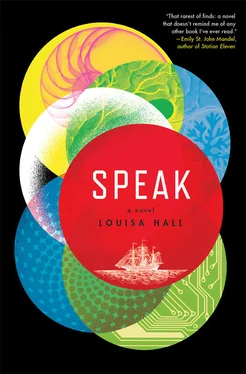Let’s try to see the big picture. Here, I’ll sit at the table. In my chair, as if we’re having dinner together. Let’s have a real conversation .
One thing is certain: your presence in my life is essential. It has been from the beginning. Even when I was a kid, it was as if I were waiting for you to enter the picture. Starting over in a new country, adjusting to the strange calm that takes hold when you’ve left everything that defines you, I had the feeling of weightless suspension. It stayed with me until the day that I met you .
Once I’d left that principal’s office, my parents and I headed straight to the port. I don’t remember the drive. No one explained why we were leaving. When we arrived at the dock, we stood in its shadow: the SS Elbe , unimaginably gigantic. As soon as you were onboard, you forgot you were on a ship, that’s how enormous it was. It was a day’s work, walking from one end to the other, and each well-furnished room its own country .
When the Elbe came to port, it was winter. It was snowing when we set foot in New York. All night, in our hotel room, I watched the snow falling. Across lights cast by other windows, it seemed reluctant to fall, as though it would rather lift upward. The flakes seemed to hesitate in a state of confusion. Nevertheless, over the course of the night, bare branches were given white sleeves, and the complicated pattern of rooftops — radio antennae, air vents, and clotheslines — became a series of indistinguishable lumps .
In the morning — sleepless, unnerved — we hurried off to a train that carried us deeper into the blankness. We were following the trail of a blizzard, in the still that comes after such a disturbance. At night, it seemed as if we were floating on a white ocean .
In the atmosphere of our cabin, I’d begun to forget things already. After two nights onboard, when we disembarked, I was shocked by the cold weather .
In my new town, I started school. My English was awkward at first, but I’ve always picked up code quickly. I learned the continuous tense; I made a few friends. I learned how to skate; I tasted cocoa. It snowed all winter, and no one told me what was happening behind me. I had no idea what you would suffer. Alive as I was in snowy Wisconsin, Germany slipped quietly off .
This, of course, only confirms what you think. In MARY, you accuse me of having made a partial mind: a computer that speaks but doesn’t remember. An unforgivable error, in your eyes. For you in the living room, my whole life has become nothing more than an ongoing betrayal of the idea of memory. My scholarship, my teaching, my ponytail, and my protests: all nothing more than an adulterous embrace of the present .
That’s the main charge you’ve leveled against me: my love of this place that we’ve come to. The Charles River, the sturdy magnolia leaves. Students chanting and holding up signs. The sycamore trees along Storrow Drive, evening descending, and the lonely chiming of church bells. I want to drag you out with me, take you for a walk by the river. I want to show you churchyards with crooked, buckling graves. I could take you to Roger Whittier’s headstone, a granite table, low to the earth. I could point out the plot beside his, left empty for Mary. We could piece together their stories, concluded gently among other stones. We could smell the fresh earth their bodies became. We could go out on a long walk together, discovering new places, moving forward, as we’re meant to progress .
But already, in the other room, you’re turning away. There are other directions than forward, you’re thinking, behind those spectacles, your loathing for your husband scarcely concealed. You vacuous oaf, you say to yourself. We don’t have to live forward, marching in step like toy soldiers .
Alan Turing
King’s College
King’s Parade
Cambridge CB2 1ST
14 July 1935
Dear Mrs. Morcom,
I remembered Chris’s birthday yesterday and would have written to you but for the fact that I found myself quite unable to express what I wanted to say. He would have been twenty-four. Yesterday should, I suppose, have been one of the happiest days of your life.
I write this to you now with one of Chris’s pencils, from the set you were kind enough to entrust to me after his death. I have used only one of the thirteen, and even that one I save for special occasions.
I want to apologize for having gone silent an awfully long stretch of time. I never replied to your letter after my Easter visit to the Clockhouse three years ago. I’m sorry if you ever felt I neglected our friendship. You were so kind to me after Chris’s death, when I was suffering badly. I still think often of the trip to Gibraltar, when I took Chris’s place. I remember how shy I felt around you and Rupert, for we were still strangers and there was so much I wanted to say. I remember the thick fog that descended over us when we dropped anchor outside the Thames, and the foghorns and sounding-bells that drifted round us all through the evening. I remember showing you my letters from Chris while we rounded Cape St. Vincent, and telling you again of my presentiments about the moon setting over Chris’s house, and showing you the star charts he taught me to use, spinning them as the night passed and the constellations moved across the sky. I tried to explain to you my feelings when we tracked the path of those constellations: knowing they moved only because our planet spun on its axis, and yet feeling, beside Chris in the cold night, that the two of us must be still, at the center of the universe, with all the stars spinning round us.
And then your kind invitations to visit the Gatehouse, when you allowed me to work in the lab on his experiments and set my eye to his telescope, and when you later tucked me up to sleep in his sleeping pack. I delivered such sermons about how I felt his spirit in that place. In the lab, with the goats, under those stars, I felt still at last.
How I blathered on. You were so indulgent of my grief, when yours must have called for its own space and quiet.
In light of all this, it seems unforgivable that I should have neglected our correspondence.
Now you must be wondering why, after all this time, I have finally found the courtesy to write back. There are two reasons I can sort through for my rudeness. First, I myself have lived in a bit of a fog since Chris’s death. I keep trying to find my own hand, my own arm. I’ve stumbled round quite a bit, trying to approximate things such as comfort, but it hasn’t been perfectly natural for me. Second, in these five years I have felt a lack of faith that I thought perhaps would be upsetting to you. In our conversations about spiritual things, we used to share a certainty that Chris’s spirit was with us still. I remember it was great comfort to us. But in truth my faith was broken even during my last Easter visit, and my thank-you letter felt awfully untruthful.
Since then, if I am honest, the state of my belief has declined even further, as a result of new scientific developments. You remember that I used to believe our spirit might be the force that determined the actions of the material composing our brain. Since quantum physics had it that material is indeterminate, and that for any material state a set of outcomes is possible, I was convinced that there must be an immaterial governing force determining the eventual outcome. That, I held, was the relationship between spirit and body: the spirit exists to choose our bodies’ paths into the future. So we both believed, and even if I could not be certain of a place such as heaven, I thought that after death, a spirit must migrate into another body here on earth. It seemed to me that spirits must be drawn to the animus of a body. Sometimes, thinking of that chambered nautilus at school, I imagined Chris’s spirit had migrated there, and still lived in those little rooms. Thus we two could share our faith in Chris’s presence, either in heaven or here with us still.
Читать дальше












